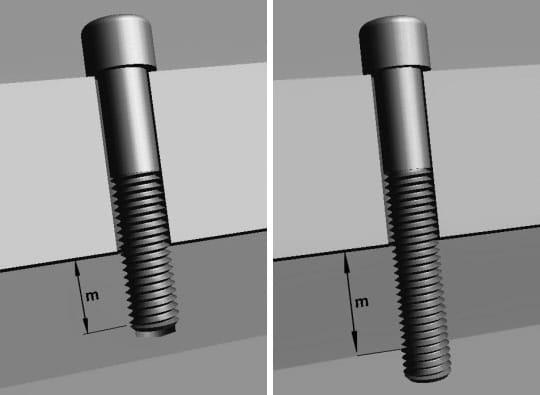Calculate the theoretical minimum required thread engagement length for blind hole and through hole applications.
Based on VDI 2230:2014
Calculate the theoretical minimum required thread engagement length for blind hole and through hole applications.
Based on VDI 2230:2014
| Material | Rm, N/mm2 |
|---|---|
| Steel | |
| 16MnCr5 | 1000 |
| 21CrMoV5-7-QT | 700 |
| 25CrMo4-QT | 600 |
| 30CrNiMo 8 | 1250 |
| 34CrMo 4 | 1000 |
| 34CrNiMo 6 | 1200 |
| 35B2-QT | 500 |
| 35NiCr18 | 1270 |
| 38MnSi-VS 5 | 900 |
| 40CrMoV4-6-QT | 850 |
| 41Cr4 | 1100 |
| 42CrV 6 | 1080 |
| 42CrMo4 | 1000 |
| 42MnV7 | 980 |
| 48CrMo4 | 880 |
| 50MnSi4 | 830 |
| 58CrV 4 | 1320 |
| C35E-QT | 500 |
| C45E-QT | 560 |
| Cq 45 | 700 |
| E295 | 470 |
| S235 JRG1 | 340 |
| S355 JO | 510 |
| Aluminium/ Aluminium Alloy | |
| AW-5083 | 260 |
| AW-6082 | 290 |
| AW-7075 | 540 |
| AlMgSi1F28 | 260 |
| AlMg4,5MnF27 | 260 |
| AlMgSi1F31 | 290 |
| AlZnMgCu1,5 | 540 |
| G-AlSi10Mg | 220 |
| G-AlSi7Mg0,3 | 230 |
| G-AlSi9Cu3 | 160 |
| GD-AlSi9Cu3 | 240 |
| GK-AlSi7Mg wa | 250 |
| GK-AlSi9Cu3 | 180 |
| Magnesium Alloy | |
| AZ91 | 310 |
| GK-AZ91-T4 | 240 |
| MgAl9Zn1 | 200 |
| MgAl4Si | 190 |
| Copper/ Copper Alloy | |
| G-CuAl10Ni | 600 |
| G-CuSn5ZnPb | 220 |
| G-CuSn7ZnPb | 240 |
| GD-CuZn37Pb | 280 |
| GK-CuZn37Pb | 280 |
| GZ-CuSn7ZnPb | 270 |
| Cast iron | |
| GJL-250 | 250 |
| GJS-400-15 | 400 |
| GJS-500-7 | 500 |
| GJS-600-3 | 600 |
| GJV-300 | 300 |
| GJV-500 | 500 |
| Titanium/ Titanium Alloy | |
| TiAI6V4 | 890 |
| Nickel/ Nickel Alloy | |
| NiCr15Fe7TiAl | 1000 |
| NiCr20TiAl | 1000 |
| Stainless steel | |
| X10CrNiMoMnNbVB15-10-1 | 650 |
| X19CrMoNbVN11-1-QT | 900 |
| X22CrMoV12-1-QT | 800 |
| X2CrNi18-9 | 450 |
| X2CrNiMo17-12-2 | 500 |
| X2CrNiMoN17-13-3 | 580 |
| X3CrNiCu18-9-4 | 450 |
| X3CrNiMoBN17-13-3 | 550 |
| X4CrNi18-12 | 500 |
| X5CrNi18-10 | 500 |
| X5CrNiMo17-12-2 | 500 |
| X6CrNi18-10 | 500 |
| X6CrNiMoB17-12-2 | 490 |
| X6CrNiTiB18-10 | 490 |
| X6NiCrTiMoVB25-15-2 | 900 |
| X7CrNiMoBNbl6-16 | 650 |

This calculation is theoretical and has to be verified by tests!
Nominal values is used as the basis for the calculations.
The thread engagement length will often in praxis be reduced due to run-in and run-out of screw and threads as well as chamfers.
Please pay attention to the definition of blind hole and through hole (you can choose this in the left top corner of application). Through holes are calculated without none-effective thread end and it is a prerequisite that the screw-end protrudes with two thread pitches minimum (2P)
If an actual through hole application cannot fulfil the above definition, then a calculation as blind hole application is recommended instead.
Effective engagement length, meff, represents the actual engagement of threaded screw/nut threads.